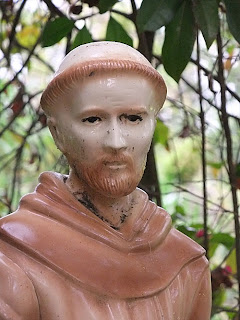Showing gratitude and blessing #4: bread and wine
 You can find an index of all the 31 Days of Encountering Judaism here.
You can find an index of all the 31 Days of Encountering Judaism here.
My hunch is that just by that title I've prompted frowny faces on both my Jewish and Christian friends. Maybe not.
But you could have knocked me over with a feather at the Shabbabeque this past summer when I saw bread (a large loaf of challah) and wine being raised up during liturgy. Whaaaa---?
Of course I read up about it.
See the thing is, that the earliest of the Christian Eucharist services were not about the atoning sacrifice of Jesus (and honestly, these days I don't know how I feel about that, but that's a topic for future exploration). Instead it was a re-creation of the "table fellowship" (phrase used by Skarsaune in "In the Shadow of the Temple") that the disciples shared with Jesus. They wanted to remember that, to keep that part of their journey together alive.
That last meal together might've been a passover meal, or a Sabbath meal. In any case, Jesus gave thanks (blessed) the bread, broke it and gave it to his disciples. He did the same with a cup of wine.
In Jewish tradition, that cup is called the kiddush cup, and at home or at Erev Shabbat services, this blessing is said:
Baruch atah Adonai, Eloheinu Melech haolam... Our praise to You, Eternal our God, Sovereign of the universe, Creator of the fruit of the vine. Praise to You, Eternal our God, Sovereign of the universe, who sanctifies us with mitzvot and takes delight in us....
(This quote is taken from "Do It Yourself Shabbat" printed by URJ Press.) Note the slightly different translation of those first six words from my post two days ago. All I gotta say is that the various ways of expressing is letting God out of the box we put him in (like the patriarchical one).
Back to blessing the bread and wine. Now Jesus took this a whole step further by saying that the bread was his Body and the wine was his Blood, which for non-Christians sounds a lot like cannibalism. Christians can't agree whether the Eucharist is meant as a remembrance of that final supper, or some sort of transformative mystery. (Or if you're Episcopalian, chances are you believe it's consubstantiation which basically means it's both bread and body, wine and blood, at the same time. Episcopalians (I'm one, remember) like to hedge their bets. Or, as we call it, take the middle way.)
What is clear is that today's Eucharist is a symbolic gesture of sharing a meal together, of coming together and dining together, of being in relationship with each other, of praying together. And if that occurs because in remembering we are taking our seats with the original disciples and Jesus, or that in saying the words of institution, bread and wine become more holy than they already are (as being part of God's creation) and through Jesus mystically join the church together into one Body ... well, who is to say if one is right and the other wrong, or that they both, in some way, might be right?
What is clear is that today's Eucharist is a symbolic gesture of sharing a meal together, of coming together and dining together, of being in relationship with each other, of praying together. And if that occurs because in remembering we are taking our seats with the original disciples and Jesus, or that in saying the words of institution, bread and wine become more holy than they already are (as being part of God's creation) and through Jesus mystically join the church together into one Body ... well, who is to say if one is right and the other wrong, or that they both, in some way, might be right?
Bottom line is this, whatever Jesus said afterward. He first gave thanks. As both Christians and Jews do before they break bread together.
PS. Yesterday's post was a bunch of poor typing: left out words, half-finished thoughts, so I did a quick fix, if you want another attempt at understanding what I was getting at.
PS. Yesterday's post was a bunch of poor typing: left out words, half-finished thoughts, so I did a quick fix, if you want another attempt at understanding what I was getting at.


Comments
Post a Comment
Thank you for taking the time to leave a comment.